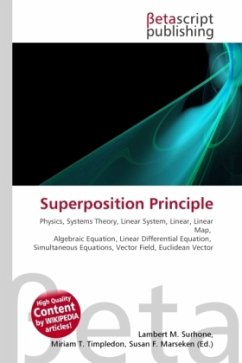High Quality Content by WIKIPEDIA articles! In physics, the principle of least action or more accurately principle of stationary action is a variational principle which, when applied to the action of a mechanical system, can be used to obtain the equations of motion for that system. The principle led to the development of the Lagrangian and Hamiltonian formulations of classical mechanics. The principle remains central in modern physics and mathematics, being applied in the theory of relativity, quantum mechanics and quantum field theory, and a focus of modern mathematical investigation in Morse theory. This article deals primarily with the historical development of the idea; a treatment of the mathematical description and derivation can be found in the article on the action. The chief examples of the principle of stationary action are Maupertuis' principle and Hamilton's principle.
Bitte wählen Sie Ihr Anliegen aus.
Rechnungen
Retourenschein anfordern
Bestellstatus
Storno








